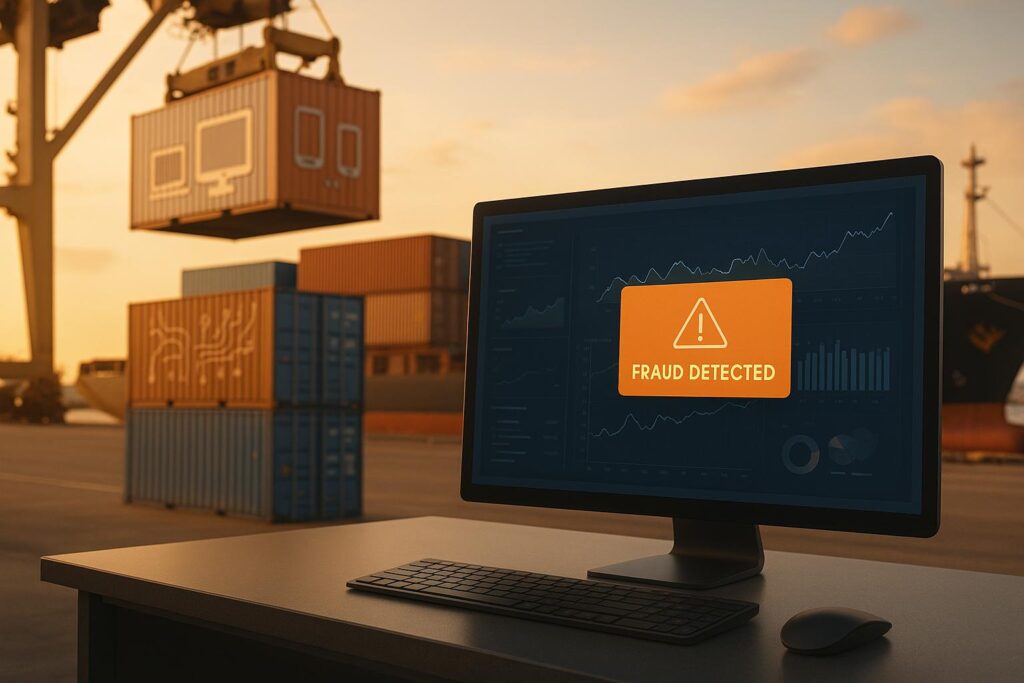Fraud in global tech trade is a growing concern. Digital products like software and SaaS are delivered instantly, making them hard to verify. High transaction volumes and online-only interactions give cybercriminals opportunities to exploit vulnerabilities. Two solutions stand out:
- Accounts Receivable Insurance (ARI): Protects against non-payment, bankruptcy, and political risks. It’s easy to implement, has predictable costs, and suits B2B companies handling large transactions.
- AI Fraud Detection: Identifies fraud in real-time by analyzing transaction patterns. While effective for high-volume operations, it requires technical expertise and ongoing maintenance.
Key Takeaway: Combining ARI for financial protection and AI for real-time fraud prevention offers a strong defense against risks in international tech trade.
Real-time fraud prevention in a real-time world
1. Accounts Receivable Insurance (ARI)
Accounts Receivable Insurance (ARI) offers tech companies protection against non-payment and political risks, particularly in the context of international trade.
Risk Coverage
ARI shields businesses from non-payment risks, whether due to bankruptcy or insolvency, and also addresses challenges like currency restrictions, trade sanctions, or political instability. Additionally, it provides credit support that can help tech companies secure better financing terms from lenders. This combination of protections integrates smoothly into existing financial systems.
Easy Implementation
Adding ARI to your operations is straightforward and doesn’t require overhauling existing systems. By partnering with ARI Global, Inc., companies can evaluate their current receivables, pinpoint high-risk markets or customers, and craft a policy tailored to their specific needs. This streamlined process allows businesses to establish coverage quickly and efficiently.
Cost Efficiency
ARI operates on a premium-based model, with rates customized to match a company’s risk profile. Beyond protecting receivables, having ARI coverage can make a business more appealing to lenders, potentially leading to better financing opportunities.
Ideal Fit for the Tech Sector
ARI is particularly beneficial for B2B tech companies involved in high-value transactions, such as those selling enterprise software, SaaS platforms, or long-term service agreements in international markets. For businesses entering new global markets where assessing customer creditworthiness can be challenging, ARI’s tailored risk assessments provide valuable support. However, companies focused on small-scale transactions or consumer markets may find ARI better suited to organizations managing significant B2B receivables.
2. AI and Machine Learning-Based Fraud Detection
In addition to Accounts Receivable Insurance, AI-powered fraud detection acts as a powerful safeguard in the international tech trade. By leveraging artificial intelligence and machine learning, businesses can detect and prevent fraudulent activities in real-time. These systems analyze transaction patterns, behaviors, and anomalies that might slip through human oversight. Below, we’ll explore the system’s risk coverage, implementation challenges, cost considerations, and the industries where it thrives.
Risk Coverage
AI systems excel at spotting payment fraud, identity theft, account takeovers, and unusual transaction patterns across global markets. Machine learning continuously evolves to address new threats, though it can struggle with entirely novel schemes if historical data is lacking. These tools monitor key indicators like transaction speed, geographic inconsistencies, and behavioral red flags – such as simultaneous orders from multiple locations. With real-time risk scoring, businesses can quickly decide whether to approve, reject, or flag suspicious transactions.
Implementation Challenges
Setting up AI-based fraud detection requires a solid technical foundation and skilled professionals, including data scientists and cybersecurity experts. Integrating these tools into existing systems can be complex, as it involves ongoing model training to minimize false positives and negatives. Companies must also navigate international data privacy laws, such as GDPR, and meet regional data handling requirements, adding another layer of complexity.
Cost Considerations
While the upfront costs for AI fraud detection can be high – covering both deployment and ongoing maintenance – the long-term benefits often outweigh the investment. These systems process large transaction volumes efficiently, reducing the cost per transaction. Additionally, they help cut down on fraudulent chargebacks, streamline manual transaction reviews, and minimize losses from fraudulent orders, making them a cost-effective solution over time.
Industry Applications
AI fraud detection is especially valuable for tech companies with high transaction volumes and well-established customer bases. SaaS platforms, digital marketplaces, and e-commerce providers often generate enough data to train machine learning models effectively. Companies selling standardized digital products with predictable pricing generally find it easier to integrate these systems. On the other hand, businesses offering complex, custom enterprise solutions may face more challenges. For example, B2C tech companies tend to experience more consistent transaction patterns, while B2B organizations, particularly those dealing with high-value transactions, may encounter higher rates of false positives due to their unique transaction behaviors.
sbb-itb-2d170b0
Advantages and Disadvantages
When considering Accounts Receivable Insurance (ARI) and AI-based fraud detection, it’s clear that each has its strengths and limitations, especially for businesses navigating international tech trade. Here’s a side-by-side comparison of key factors:
| Factor | Accounts Receivable Insurance | AI and Machine Learning-Based Fraud Detection |
|---|---|---|
| Effectiveness | Covers non-payment, bankruptcy, and political risks with guaranteed claim payouts | Excels at detecting fraud in real time but may falter with new schemes lacking data |
| Cost Structure | Predictable premiums with clear ROI based on policy terms | High initial investment but lower per-transaction costs as scale increases |
| Implementation Complexity | Simple setup through brokers with minimal technical effort | Requires advanced infrastructure and technical expertise |
| Speed of Protection | Coverage starts immediately upon policy activation, though claims take time to process | Instant fraud scoring and automated responses |
| Scalability | Easily adjustable policies to match business growth | Highly scalable but demands ongoing model updates |
| Maintenance Requirements | Minimal upkeep beyond renewals and premium payments | Requires constant monitoring, updates, and optimization |
Key Insights
Accounts Receivable Insurance (ARI):
ARI stands out for its reliability in protecting against non-payment, bankruptcy, and political risks. Its predictable costs make financial planning easier, and the setup process is straightforward, requiring little technical expertise. However, ARI operates as a reactive measure. This means fraudulent activity may occur before a claim is filed and processed, which could delay financial recovery.
AI-Based Fraud Detection:
AI systems shine in real-time fraud prevention, making them especially effective for high-volume transactions. These systems continuously learn and adapt to new threats, improving over time. However, they come with significant upfront costs and require ongoing investments in maintenance, monitoring, and model updates. Additionally, their effectiveness may vary depending on the transaction volume and the availability of historical data.
Cost and Timeline Considerations
From a cost perspective, ARI offers steady, predictable premiums that align with a company’s revenue growth. In contrast, AI systems demand a larger initial investment but can reduce per-transaction costs as transaction volumes grow. When it comes to implementation, insurance policies can often be activated within days or weeks, providing rapid protection. On the other hand, AI systems may take months to set up, integrate, and fine-tune, making them better suited for companies with longer planning horizons and sufficient technical resources.
The Case for a Hybrid Approach
Many tech companies find value in combining these strategies. ARI provides comprehensive financial protection against major risks, while AI-based systems handle real-time fraud prevention. Together, they address both immediate threats and long-term scalability. However, this approach requires careful coordination to avoid overlapping costs or coverage gaps.
Ultimately, choosing the right mix depends on a company’s specific needs – whether it’s immediate protection for entering new markets or building a robust, adaptive system for the future. By balancing these tools effectively, businesses can strengthen their defenses and better navigate the challenges of international tech trade.
Conclusion
Navigating fraud risks in international tech trade calls for strategies tailored to the unique challenges of this dynamic landscape.
ARI provides a strong layer of financial security, protecting businesses from risks like non-payment, bankruptcy, and political instability. This makes it an excellent choice for companies stepping into unfamiliar markets. Plus, its quick setup offers peace of mind right from the start.
On the other hand, AI and machine learning bring real-time threat detection and automated responses into the mix. These tools are particularly useful in high-volume operations, though they do require technical expertise and consistent updates to stay effective. They work best when paired with traditional safeguards, creating a balanced approach.
By combining ARI with AI-powered detection, businesses can achieve a well-rounded defense. Start by leveraging ARI when entering unpredictable markets, and then assess how AI can enhance your protection based on the nature of your transactions.
Ultimately, success in international tech trade hinges on aligning fraud prevention with your specific risk profile. Regularly revisiting and refining your strategy ensures you’re prepared for global changes. With the right tools and a thoughtful approach, you can confidently expand into new markets while safeguarding your financial health. This balanced strategy underscores the importance of blending immediate protections with the ability to adapt over time.
FAQs
How can Accounts Receivable Insurance (ARI) help tech companies manage fraud risks in international trade?
Accounts Receivable Insurance (ARI) offers tech companies a safety net against the financial uncertainties of international trade. It protects businesses from non-payment by clients, whether due to bankruptcy, political upheaval, or other unforeseen circumstances. This type of coverage helps ensure a steady cash flow, allowing companies to confidently extend credit terms to overseas buyers without fear of significant financial setbacks.
Beyond just protection, ARI provides tech companies with access to tailored risk evaluations and policies designed to meet their unique requirements. This means businesses can venture into global markets with reduced financial risk, supporting their growth and ensuring stability in their international operations.
What challenges do businesses face when using AI for fraud detection in international tech trade?
Challenges in Implementing AI-Based Fraud Detection Systems
When businesses adopt AI-driven fraud detection systems, they often face a range of hurdles, particularly in the realm of international tech trade. One of the biggest challenges is dealing with false positives – instances where legitimate transactions are mistakenly flagged as fraudulent. These errors can disrupt operations, frustrate customers, and strain relationships, making it a critical issue to address.
Another significant obstacle lies in the integration of AI into existing systems. This process can demand extensive time, resources, and technical know-how, which may not always be readily available. On top of that, the lack of labeled fraud data presents a major roadblock. AI models rely on high-quality, labeled datasets to learn and improve, and without them, their performance can falter. Compounding the problem is the constantly changing tactics of fraudsters, which makes it challenging to keep detection systems effective and up-to-date.
To tackle these challenges, businesses need to invest in a solid data infrastructure, ensure their detection models are updated regularly, and strike a careful balance – catching fraudulent activities without causing unnecessary disruptions for legitimate transactions.
Why should tech companies combine AI fraud detection with Accounts Receivable Insurance, and what benefits does this offer?
Tech companies can strengthen their defenses against fraud in international trade by combining AI fraud detection with Accounts Receivable Insurance (ARI). Here’s how it works: AI tools excel at spotting fraudulent activities in real-time, while ARI provides a safety net against financial risks like non-payment or bankruptcy. Together, they form a proactive and reliable strategy for managing risks.
This pairing brings clear benefits: more accurate fraud detection, minimized financial losses, and quicker claims processing. Integrating these tools doesn’t just streamline operations – it also fosters trust in international trade relationships. By leveraging this combination, businesses are better equipped to handle the challenges and uncertainties of global markets.



